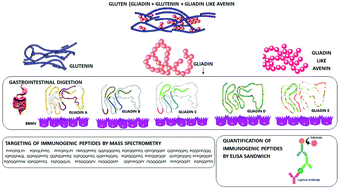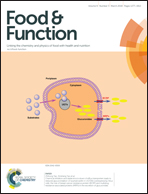Identification and characterization of proteolytically resistant gluten-derived peptides†
Abstract
The lack of digestibility of certain gluten proteins is essential in the development of celiac disease (CD). Gluten proteins are remarkably resistant to luminal and brush-border proteolysis owing to their high proline and glutamine content. Consequently, large fragments remain intact after digestion exerting toxic effects. Intestinal brush-border membrane vesicles (BBMV) have been described as having strong proteolytic activity mainly through prolyl endopeptidase enzymes. The purpose of this work was to monitor the gastrointestinal digestion of specific CD epitopes by means of an in vitro gastrointestinal digestion model that included incubation with brush-border membrane enzymes. Gluten hydrolysates were characterized by mass spectrometry and the immunologic peptides were tracked by searching the main T-cell stimulating epitopes which have been widely described. The immunologic potential of gluten hydrolysates was further analysed by enzyme-linked immunosorbent assay (ELISA). The results showed that the composition of gluten hydrolysates depended on the digestion time and protein structural characteristics. On the other hand, the main T-cell stimulating epitopes formed during hydrolysis depend on the precursor protein. Glutenin oligopeptides were degraded faster whereas gliadin, mainly α-gliadin oligopeptides, remained intact for a long time. MS-based analysis showed that the formation of the epitopes from γ-gliadin and ω-gliadin or glutenin was favoured but they were generally degraded during the gastrointestinal treatment. However, the peptides containing the epitope PFPQPQLPY (α-gliadin) remained intact even after 180 min of digestion time. Overall, from all the epitopes tracked, PFPQPQLPY was the most resistant to in vitro BBMV digestion.



 Please wait while we load your content...
Please wait while we load your content...